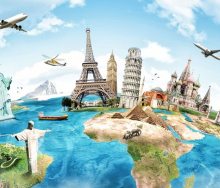Travel brands are finding smart ways to use generative Artificial Intelligence (AI) technology already, but what the market is seeing so far is just the tip of the iceberg, says global travel media company, Skift.
Skift recently launched its new Skift Research AI in Travel Report and, in doing so, shared an overview of current generative AI trends, opportunities and challenges. This took place in a Skift Research LinkedIn Life webinar at the end of April.
Operational efficiencies, customer support, reputation management and search were four areas in travel businesses where generative AI could make an impact, Skift said. And the company predicts more solutions, apps and plug-ins that will improve the back and front service end of the travel industry in the future.
Rafat Ali, Founder and CEO of Skift; Seth Borko, Director of Skift Research; and Justin Dawes, global travel tech reporter, shared with listeners what they know about generative AI so far. The trio described an environment where the pace of innovation had accelerated wildly.
They said early adopters of generative AI technology included online travel agencies like Trip.com, Kayak, Expedia, and booking.com, as well as search engines Bing and Google. Visit Denmark and Air India are already using generative AI technology in destination marketing, and new start-ups are also building on AI technology.
So far in travel, a popular use of generative AI is finding reviews and responding to them (reputation management). But there will be more! The example was given of chatbots helping with travel planning and booking in time and guiding people (customers) to discover flights and destinations in time.
Ali also predicted that future generative AI technology and AI-enabled apps could help fragmented distribution, inventory and supply chains in the future and that this could actually happen quite quickly, as the pace of development was so fast. Skift said more travel inspiration and planning tools (how people discover flights and destinations) were also on the horizon.
“There’s a big customer service opportunity,” said Dawes. He shared an example of short-term rental suppliers that use chatbots to engage with customers. Wait times at call centres could be improved using smart technology and chatbots. “Chatbots are a good way to show the public what generative AI can do.”
Skift said another major reason why travel companies were so keen to invest in generative AI technology was that it gave them the ability to mine and store large volumes of customer data. Data would become the ‘new oil’, and the panel spoke about how this new “arms race” would change the distribution landscape.
Could AI, by simply recommending the most popular locations or destinations, contribute to overtourism? Or could the technology be used to disperse travellers more widely, and thus help prevent overtourism? “These are the big questions we are trying to think through and to understand,” the panel said.
Marketing and content generation is low-hanging fruit for travel companies that want to leverage generative AI technology in their business. The team said: “Storytelling is what travel is all about. It’s very story-rich, content-rich.” They agreed that generative AI technology was only going to get better, and so its uses and the quality of the content produced by tools like Chat GPT were likely to improve.
Google and chat
Ali was excited about the prospect of travellers eventually being enabled to have chats with their Google Maps apps. He said this functionality would make Google Maps a ‘super app’. However, he said it might not be on Google’s radar because it seemingly was not a tool for future revenue generation.
Whether Google does or doesn’t invest in chat functionality remains to be seen. Would it make the app a threat to other intermediaries or even booking platforms in the future? That, too, is still unknown. What is clear is that we’re just scratching the surface of what generative AI can do to make travel better for travel companies and their customers.
Dawes pointed out that customers would need to be given time to trust generative AI technology and chatbots. But, he said, once customers were comfortable and trust was established, it would feel more ‘human’ to chat to Google. The question for travel brands and travel agents, is: Will it feel more ‘human’ to engage with the search engine than other online tools or in-person call centres, or platforms?
Leapfrogging NDC?
One of the big questions Skift’s conversation raised was whether generative AI technology would eventually leapfrog Iata’s NDC programme and modernise airfare and content distribution in new, integrated ways. One listener wondered whether the same challenges that existed in corporate travel would pervade an AI alternative, especially the inability of agents to service certain aspects of the booking when NDC content was booked externally.
Some of the interesting questions and issues from listeners were:
*Did the Skift trio think customers would be more at ease dealing with an AI system than a human travel designer?
*Was it possible that small, independent hotels would push back and ignore AI altogether?
*Was there an opportunity for generative AI technology to improve carbon emission tracking and offsetting?
*What will this do to the affiliate programmes that the big OTAs run? “Content creators, what do you think this landscape would look like?”
*An adventure specialist suggested: “It’s all in the questioning. Experiment for hours and hours and you’ll be surprised. Try this: ‘Bing, you are my travel purchasing adviser. You will look up any travel experiences I am thinking of’.”
















